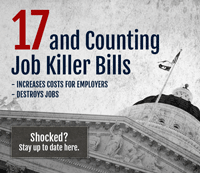 The Assembly Labor and Employment Committee this week passed a “job killer” bill imposing a one-size-fits-all scheduling mandate on general retail employers.
The Assembly Labor and Employment Committee this week passed a “job killer” bill imposing a one-size-fits-all scheduling mandate on general retail employers.
AB 357 (Chiu; D-San Francisco) dramatically increases the cost of doing business for a broadly defined “food and general retail establishment” in California by exposing employers to significant penalties and litigation for accommodating employee and business scheduling demands, creating a new protected classification for employees, and a new leave of absence for employees.
The bill passed the Assembly Labor and Employment Committee 4-3 on April 22. It was not a party-line vote. Democrat Assemblymember Evan Low (D-Campbell) raised concerns with the bill and voted “no.”
Key Vote
Ayes: Chu (D-Monterey Park), Hernández (D-West Covina), McCarty (D-Sacramento), Thurmond (D-Richmond),
Noes: Low (D-Campbell), Harper (R-Huntington Beach), Patterson (R-Fresno).
The bill now heads to the Assembly Appropriations Committee; no hearing date has been set.
Predictable Scheduling Mandate/Protected Leave of Absence
The California Chamber of Commerce has identified AB 357 as a “job killer” because:
- Creates Significant Penalties Against Employers for Schedule Changes Which Will Limit Flexibility. Under AB 357, an employer that “moves to another date or time, or cancels” a previously scheduled shift or “requires” an employee to work an unscheduled shift is forced to pay “compensation” at the employee’s “regular hourly rate.” Financially punishing an employer for responding to last-minute business demands or, worse, for accommodating an employee’s requests is unfair. It will limit or even eliminate flexibility for employee requested schedule changes.
- Discourages Employers from Offering Additional Work to Part-Time Employees. Under AB 357, if additional hours of work become available after an employer has issued the schedule, and the employer offers that additional work to a part-time employee, AB 357 penalizes the employer. Such a penalty discourages employers from offering additional hours of work to part-time employees, thereby ultimately harming employees who are working part-time.
- Creates New Leave of Absence for Employees. AB 357 allows an employee to take 16 hours of protected leave from work in order to attend any appointment at the county human services agency upon reasonable notice to the employer. Given the anti-retaliation/discrimination provisions in the Labor Code that protect an employee for any right exercised by an employee, an employer who suspects abuse under this provided leave and questions the employee, could be subject to litigation as such conduct could constitute “retaliation” or “discrimination.”
- Creates a New, Protected Classification of Employees. AB 357 also creates a new, protected classification of employees in California defined as any employee who: receives CalWORKS ; is a parent, guardian or grandparent of one or more children who receive CalWORKS; or, someone who receives CalFresh food assistance. Combined with the new leave referenced above, this precludes an employer from taking any conservative action against an employee who regularly misses work on a daily, weekly or monthly basis to attend an appointment, for threat of discrimination/retaliation litigation.
- Subjects Employers to Multiple Threats of Extensive Litigation. In addition to litigation under the Private Attorneys General Act (PAGA), an employee could also threaten an unfair competition claim under Business and Professions Code Section 17200, as well as a common law wrongful termination claim. Increasing the cost of doing business on all employers who engage in retail activity with the “additional pay” mandate, as well as subjecting them to multiple threats of litigation, is detrimental to the economy and the ability for businesses to thrive in this state.
San Francisco Ordinance
In December 2014, the San Francisco Board of Supervisors passed the “Retail Workers Bill of Rights” that included a “fair scheduling” mandate, similar to that proposed in AB 357. San Francisco Mayor Ed Lee did not sign this ordinance, which will not go into effect until July 3, 2015. San Francisco has yet to see the consequences, either intended or unintended, from the impact of its local ordinance mandating penalties for schedule changes.
Given this, CalChamber Policy Advocate Jennifer Barrera explained to the committee that it is premature to impose this broad and punitive measure on all “food and general retail establishments” in California, especially those areas with high unemployment rates.
More Information
Follow @CAJobKillers on Twitter for updates on the 2015 “job killer” bills.
Staff Contact: Jennifer Barrera

